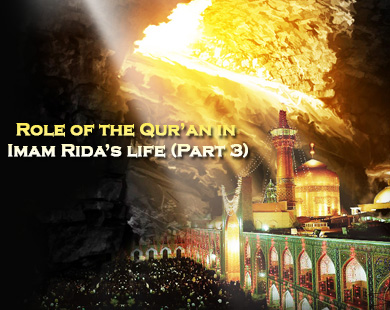This sermon is regarded as one of the excellent sermons of the Imams from among the ahl al-Bayt, peace be on him, and among the marvelous sermons which have been transmitted from them regarding the matters of Allah's Unity. If Imam al-Rida, peace be on him, had had no legacy except this sermon, then it would have been a sufficient proof of his Imamate and his reaching an exalted rank of knowledge and excellence which none has ever reached except the infallible Imams, peace be on him.
As this sermon is of great importance, his Eminence, the late Yahya b. Mohammed 'Ali has explained it and mentioned in the introduction to it
"Surely the famous sermon which has been mentioned regarding "Allah's Oneness belongs to His Excellence, Holy Presence, Purified Yard, the eighth of the Imams of the religion, the Imam of mankind, 'Ali b. Musa al-Rida, the greeting and praise be on him.
That is because it is a deep see containing advantages and perceptions, including the techniques of science and kinds of knowledge which nothing can gather except it, and so on.
As for composing this sermon is that when al-Ma'mu`n desired to install the Imam as his successor, the Ha`shimites (the 'Abba`sids) envied the Imam and said to al -Ma'mu`n: "Do you want to appoint an ignorant man who has no insight to direct the caliphate? Therefore send for him. He will come to us and you will decide how his ignorance decides you against him." So he sent for him and he came. The Ha`shimites said to him:
"O Abu` al-Hasan, ascend the pulpit and display for us a sigh whereby we may worship Allah." So he ascended the pulpit and sat for a long time, his head bowed in silence. Then he trembled a great trembling and stood up straight, praised and lauded Allah, and asked His blessing for His Prophet and his Household. Then he said:
"The first element in the worship of Allah is knowledge of Him, the root of knowledge of Him is to profess His Oneness, and the correct way to profess the Oneness of Allah is to negate attributes from Him. For the powers of reason testify that every attribute and everything possessing an attribute is created.
Everything possessing an attribute testifies that it has a Creator which is neither attribute nor possesses an attribute. Every attribute and everything possessing an attribute testify to connection (between the attribute and that to which it is attributed). Connection testifies to temporality. And temporality testifies that it accepts not the Beginningless, which accepts not the temporal.
"So it is not Allah whose Essence is known through comparison. It is not His Oneness that is professed by someone who attempts to fathom Him. It is not His reality that is attained by someone who strikes a similitude for Him. It is not He who is confirmed by him who professes an end for Him. It is not He to whom refers he who points to Him. It is not He who is meant by him who compares Him (to something). It is not to Him that he who divides Him into parts humbles himself. And it is not He who is desired by him who conceives of Him in his imagination.
"Everything that can be known in itself is fashioned. All that stands apart from Him is an effect. Allah is inferred from what He fashions, the knowledge of Him is made fast by the powers of reason, and the argument for Him is established by (man's) primordial nature.
"Allah's creating of the creatures is a veil between Him and them. His separation from them is that He is disengaged from their localization. That He is their origin is proof for them that He has no origin, for none that has an origin can originate others. That He has created them possessing means (of accomplishing things) is proof that He has no means, for means are witness to the poverty of those who use them.
"So His names are an expression, His acts are (a way) to make (Him) understand, and His Essence is reality. His inmost center separates Him from creation, and His otherness limits what is other than He. Therefore ignorant of Allah is he who asks for Him to be described! Transgressing against Him is he who seeks to encompass Him. Mistaken is he who imagines to have fathomed Him! Who so says 'how?' has compared Him (to something).
Who so says 'why?' has professed for Him a cause. Who so says 'when?' has determined Him in time. Who so says 'in what?' has enclosed Him. Who so says 'to what?' has professed for Him a limit. Who so says 'until what?' has given Him an end. Who so gives Him an end has associated an end with Him. Who so associates an end with Him has divided Him. Who so divides Him has described Him. Who so describes Him has deviated from the straight path concerning Him.
"Allah does not change with the changes undergone by creation, just as He does not become limited by delimiting that which is limited. He is One, not according to the explanation offered by number; Outward, not according to the explanation of being immediate (to the senses); Manifest, not through the appearance of a vision (of Him); Inward, not through separation; Apart, not through distance; Near, not through approach; Subtle, not through corporealization; Existent, not after non- existence; Active, not through coercion; Determining, not through the activity of thought; Directing, not through movement; Desiring, not through resolution; Willing, not through directing attention; Grasping, not through touch; Hearing, not through means; and Seeing, not through organs.
"Times accompany Him not, places enclose Him not, slumber sizes Him not, attributes delimit Him not, and instruments are of no use to Him. His being precedes times, His existence non-existence and His beginninglessness beginning.
"By His giving sense to the sense organs it is known that He has no sense organs. By His giving substance to substances it is known that He has no substance. By His causing opposition among things it is known that He has no opposite. By His causing affiliation among affairs it is known that He has no affiliate.
He opposed darkness to light, obscurity to clarity, moisture to solidity, and heat to cold. He joins together those things which are hostile to one another and separates those which are near. They prove (the existence of ) their Separator by their separation and their Joiner by their junction. That is (the meaning of) these words of Him, the Great and Almighty: And of everything created We two kinds; haply you will remember.
"So through them He separated 'before' and 'after' that it might be known that He has no before and after. They testify with their temperaments that He who gave them temperaments has no temperament. They prove by their disparity that He who made them disparate has no disparity. They announce through their subjection to time that He who subjected them to time is not subject to it Himself.
"He veiled some of them from others so that it might be known that there is no veil between Him and them other than them. His is the meaning of lordship when there was none over whom He was Lord, the reality of godhood when there was nothing for whom He was God, the meaning of Knower when there was nothing to be known, the meaning of Creator when there was nothing created and the import of hearing when there was nothing to be heard. It is not because He created that He deserves the meaning (of the term) 'Creator' and not because He brought the creatures into being that the meaning of 'making' is derived.
"How (should it not be so)? For mudh ('ever since') conceals Him not, qad ('already') brings Him not near, la'alla ('perhaps') veils Him not, mata ('when') limits Him not in time, hïn ('at the time of') contains Him not, and ma'a ('with') brings Him not into association. Instruments limit only themselves and means allude only unto their own like. Their activities are found only in things. Mudh withholds things from being eternal, qad shields them from beginninglessness, and law la ('if only') wards off perfection.
Things become separate and prove (the existence of) their Separator. They become distinguish and prove their Distinguisher. Through them their Maker manifests Himself to the powers of reason. Through (these powers) He becomes veiled to sight, to them imaginations appeal for a decision, in them is substantiated (only) other than Him, from them is suspended the proof and through them He makes known to them the acknowledgment.
"Confirmation of Allah is made fast by the powers of reason, and faith in Him reaches perfection through acknowledgment. There is no religiosity except after knowledge, no knowledge except through sincerity, and no sincerity along with comparison. There is no negation of comparison if there is affirmation of attributes.
"So nothing in creation is found in its Creator. All that is possible in it is impossible in its Maker. Movement and stillness do not affect Him. How should that which He effects (in others) have effect upon Him, or that which He has originated recur for Him? Then His Essence would be disparate, His inmost center divided, His signification prevented from eternity. How would the Creator have a meaning different from the created?
"If something from behind limited Him, then something in front would limit Him. If perfection were seeking Him, imperfection would be upon Him. How should that which does not transcend temporality be worthy of (the Name) 'Beginningless'? How should that which does not transcend being produced produce the things (of the world)? There then would have arisen in Him a sign of having been made and He would become a proof after having been the proven.
"There is no argument in absurd opinions (such as the above), no answer when it (absurdity) is asked about, no glorification of Him in its meaning. Nor is there any ill in distinguishing Him from creation, unless it be that the Eternal accepts not to be made two, nor the Beginningless to have a beginning.
"There is no god but Allah, the All-high, the Tremendous. They have cried lies who ascribe equals to Allah! They have gone astray into far error and suffered a manifest loss! And Allah bless Mohammed, the Prophet, and his Household, the good, the pure."
This great sermon contains philosophical and theological researches; it shows the scientific abilities of Imam al-Rida, peace be on him; it clearly indicates that the 'Abba`sids were mistaken when they though that the Imam was incapable of discussing scientific researches. It is certain that most of those who listened to the sermon of the Imam did not understand these philosophical matters, which the Imam, peace be on him, has presented, and which has dealt with the most important matters of Allah's Oneness.




















